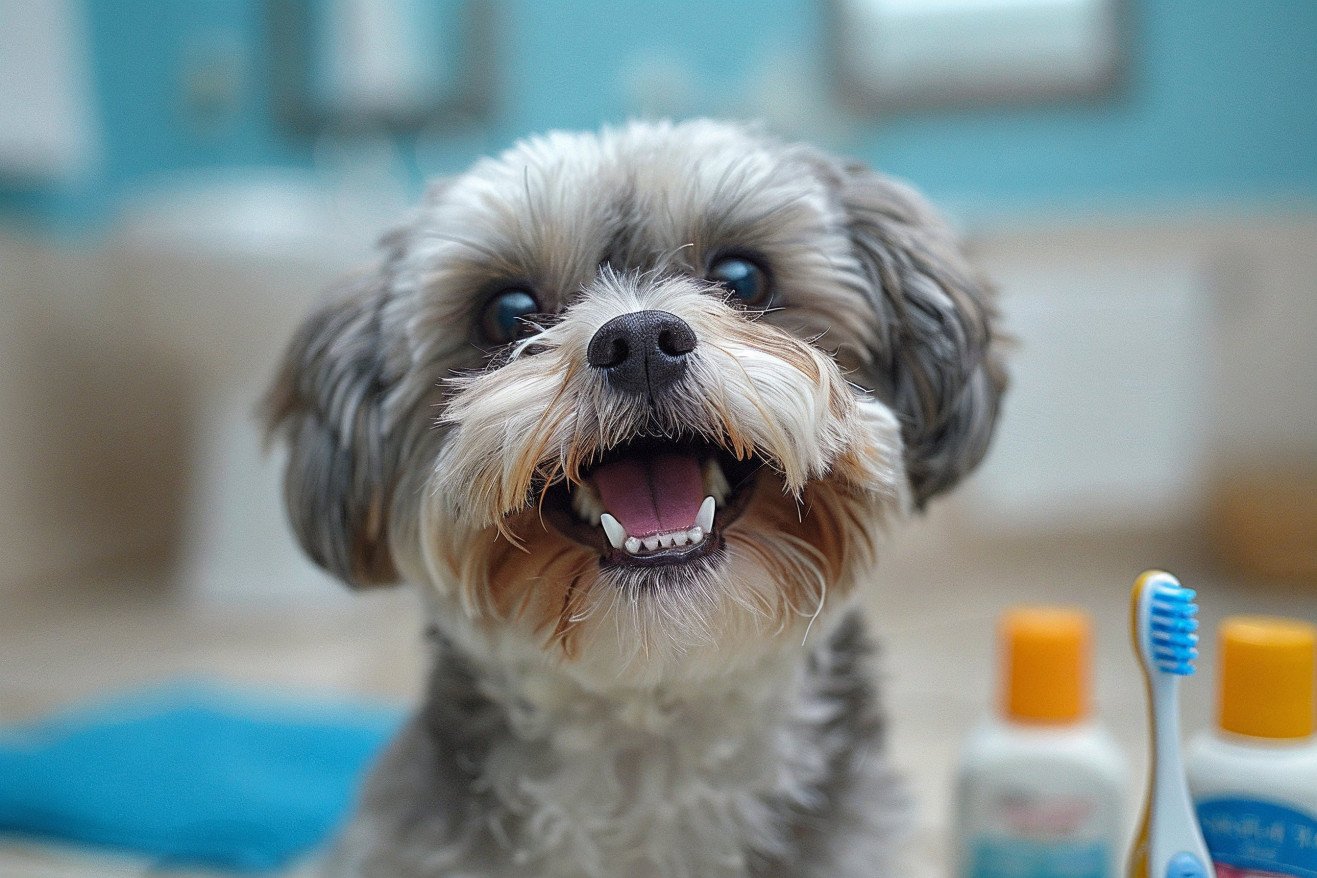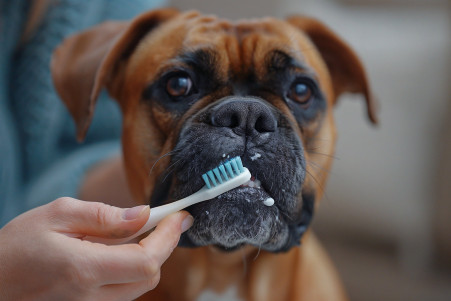Do Dogs Get Cavities? How to Stop Tooth Decay in Dogs
22 April 2024 • Updated 21 April 2024

Dogs can get cavities, and just like in humans, they can cause tooth decay and pain if not treated. Plaque and tartar build up on a dog's teeth, and the bacteria that live in this buildup can produce acids that eat away at the enamel and cause cavities. While dry dog food can help remove some tartar, the best way to prevent cavities is to brush your dog's teeth daily with dog-friendly toothpaste and have their teeth cleaned by a vet once a year.
To learn more about what causes cavities in dogs, how to prevent them, and what can be done to treat them, we'll take a deep dive into the latest research from veterinary dentists and other animal health professionals. Their work covers everything from the unique structure of a dog's mouth to the impact of diet and oral bacteria to the most effective ways to care for a dog's teeth and keep them healthy. By the end of this in-depth investigation, pet parents will have the information they need to make sure their four-legged friends don't have to deal with the pain of cavities.
Can dogs get cavities?
Causes of Dog Cavities
The primary cause of cavities in dogs is plaque and tartar buildup on the teeth, which can lead to bacteria that produce acids that erode the tooth enamel. As New York Vets notes, when bacteria stick to the teeth, acid is created and it starts to break down the enamel, which can eventually lead to the decay of the tooth root.
A diet that's high in fermentable carbohydrates and sugary snacks has been shown to increase plaque and the risk of cavities, according to a study in PMC. The bacteria in the mouth consume the carbohydrates and in turn produce the acids that break down the tooth.
Health issues, such as diabetes and dry mouth, can also lead to a decrease in saliva, which can reduce the mouth's ability to neutralize acids and remineralize teeth, making dogs more likely to develop cavities. Genetics and breed also have an impact, with breeds like Chihuahuas, Bulldogs and Shih Tzus showing a higher risk due to misaligned teeth or deep pits that can trap food.
The shape and alignment of a dog's teeth can also lead to hard-to-reach areas where plaque and tartar can build up. Deep occlusal pits on the chewing surface of a dog's molars are a common place for cavities to form if they aren't cleaned properly. Knowing these risk factors is important for starting a dental care routine for dogs.
How to Tell If Your Dog Has a Cavity
Discoloration or staining on the teeth, especially near the gum line or in the fissures of the teeth, may be a sign of a cavity, notes Marcello Veterinary Hospital. Changes in chewing habits, such as dropping food or chewing on one side of the mouth, can be a sign of pain or discomfort caused by a cavity, notes Natick Vets.
Excessive drooling or a refusal to eat can be a sign of pain or sensitivity caused by a cavity, according to Concord Vets. Bad breath or an unusual smell coming from the mouth can also be a sign of dental problems, including cavities. Holes or pits in the teeth, as well as teeth that are cracked or broken, can be signs of advanced tooth decay or cavities.
It's important to recognize these signs and symptoms early so that pet parents can get their dogs to the vet for care before their dog's dental health worsens. With watchfulness and early intervention, dog parents can help make sure their dogs have healthy, pain-free teeth.
Preventative Dental Care: Brushing, Chews, and Professional Cleanings
Brushing with a soft-bristled toothbrush and dog toothpaste is the most effective way to remove plaque and prevent cavities in dogs, WebMD reports. Dental chews, treats, and toys can also help remove plaque and tartar, but they should be used in addition to brushing, not in place of it, WHIMZEES explains.
Feeding a balanced diet that promotes dental health and avoiding giving dogs too many sugary treats can also help prevent cavities, the PMC study says. Professional dental cleanings by a vet, which are usually recommended once a year, are necessary to remove tartar and check for any dental problems, VCA Animal Hospitals says.
Establishing dental care habits early, such as brushing a puppy's teeth, can help ensure that dogs are used to dental care and are less likely to develop dental problems later in life. With the right preventative care, dog owners can make sure their pets have healthy, cavity-free teeth.
How Are Cavities in Dogs Treated?
The treatment for cavities in dogs will depend on the severity and location of the cavities. For example, in mild cases, a fluoride treatment or dental sealant may be used to remineralize the tooth and prevent further decay, notes Poway Vets. Meanwhile, moderate cavities may require a filling or dental restoration to fix the tooth's structure.
If the cavity is severe or the tooth decay is extensive, a root canal or extraction may be needed to prevent infection and alleviate pain, according to VCA Animal Hospitals. The PMC study on revisiting periodontal disease in dogs also points out that periodontal surgery may be necessary in some cases to help slow the progression of the disease.
It's important for dogs to receive regular dental exams and for cavities to be treated as soon as possible to avoid further complications and discomfort. By catching and treating dental problems early, dog owners can help make sure their pets have healthy, pain-free smiles.
How to Keep Your Dog’s Teeth Healthy: Tips and Best Practices
To keep your dog’s teeth healthy, it’s important to establish a regular dental care routine. WebMD explains that brushing a dog’s teeth daily or weekly with a soft-bristled toothbrush and dog-safe toothpaste is the most effective way to remove plaque and prevent cavities.
In addition, it can be helpful to offer dental chews, treats, and toys that are designed to reduce plaque and tartar, according to the American Kennel Club. Water additives or oral rinses can also help with breath and plaque control, says BeChewy.
It’s also important to make sure your dog receives an annual professional dental cleaning from a veterinarian to remove tartar and catch any potential dental problems early, says the Veterinary Oral Health Council. In addition, watching your dog’s diet, limiting sugary treats, and choosing dental-friendly foods can help prevent cavities, according to the PMC study.
By following these tips and best practices and making them part of your dog’s regular routine, you can help make sure your pet enjoys a lifetime of good dental health and a beautiful, cavity-free smile.
Preventing Doggy Dental Woes: Wrapping Up Tooth Decay Insights
While cavities are less common in dogs than in humans, they can still be painful and lead to other health problems if they aren't treated. To keep your dog's teeth healthy and prevent cavities, it's important to make sure they get regular dental care, including brushing, dental chews, and professional cleanings.
If your dog does develop a cavity, or any other dental issue, catching it early and getting it treated quickly can help prevent it from getting worse and ensure your dog's long-term health. By learning about the causes, symptoms, and treatments of cavities in dogs, you can make sure that you're doing everything you can to keep your pet's teeth healthy.
By making sure that your dog's teeth are well cared for at home and that they see a vet regularly for check-ups, you can prevent cavities and make sure that your dog has a healthy, happy smile.


